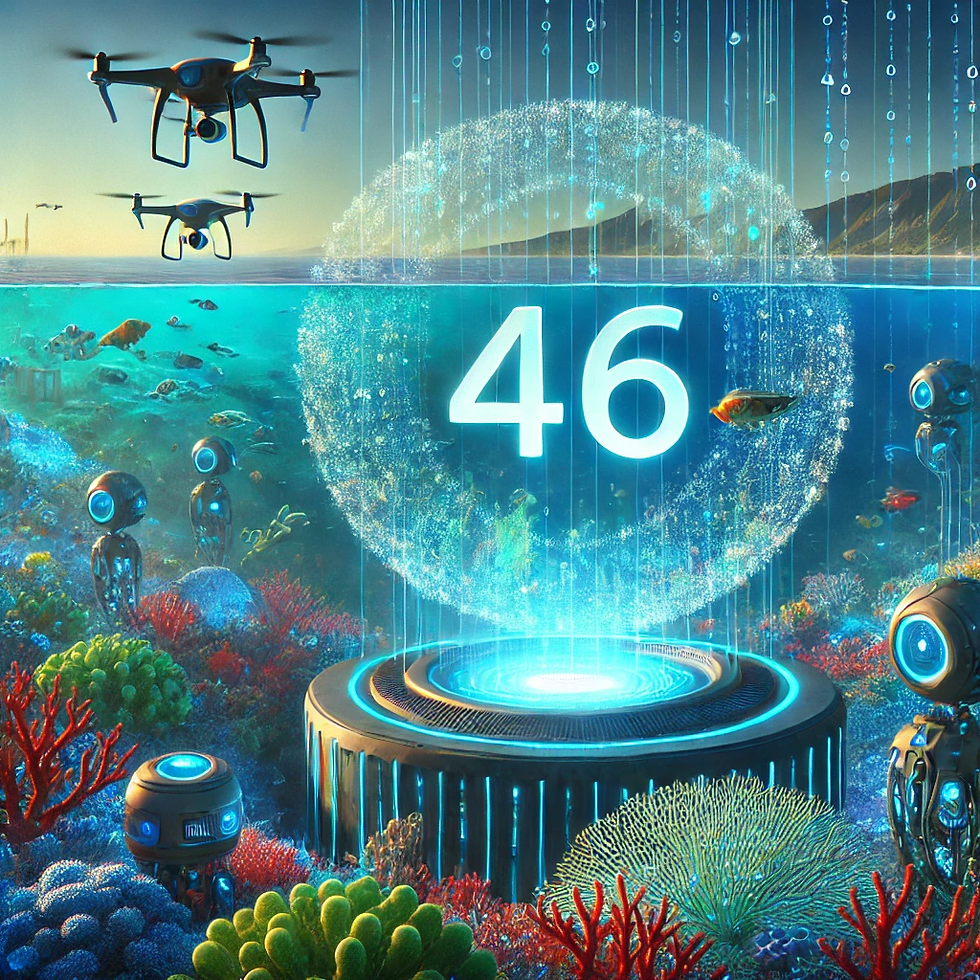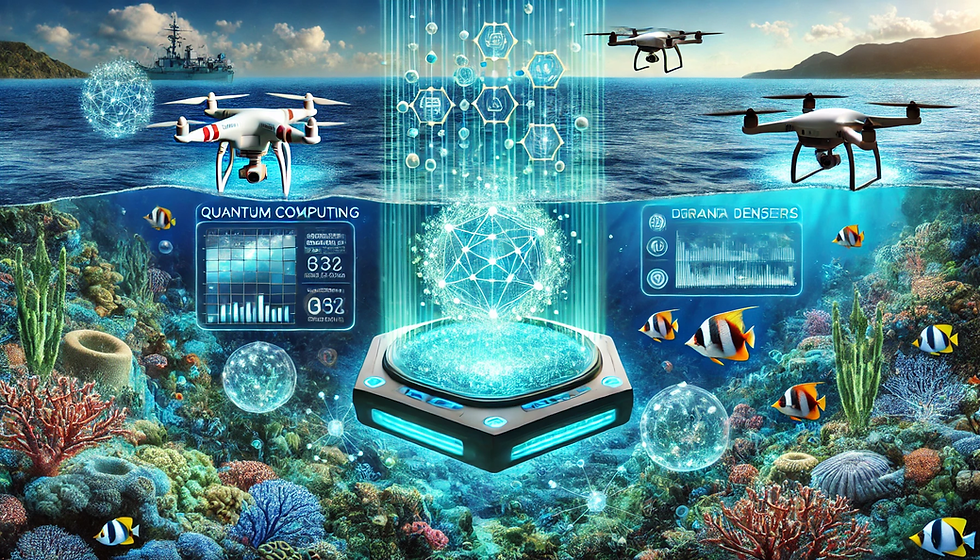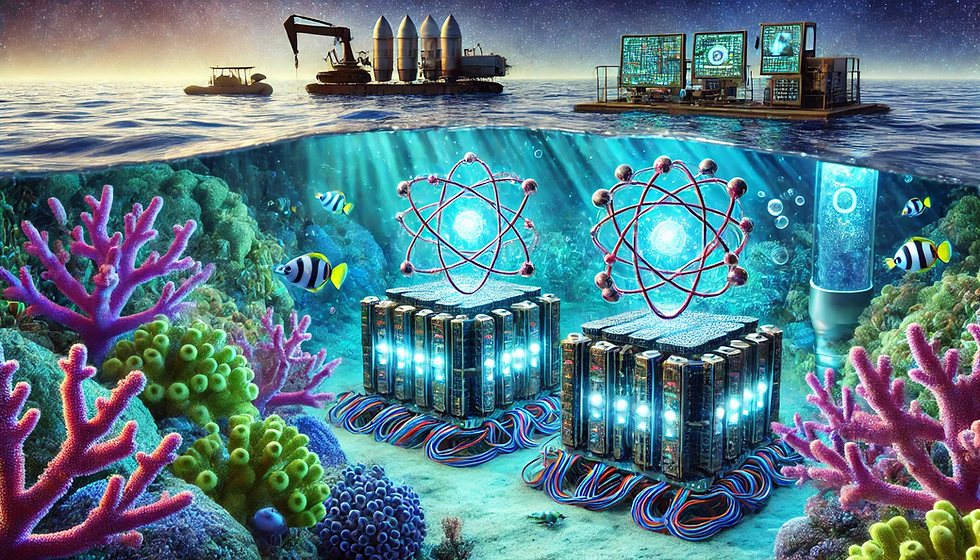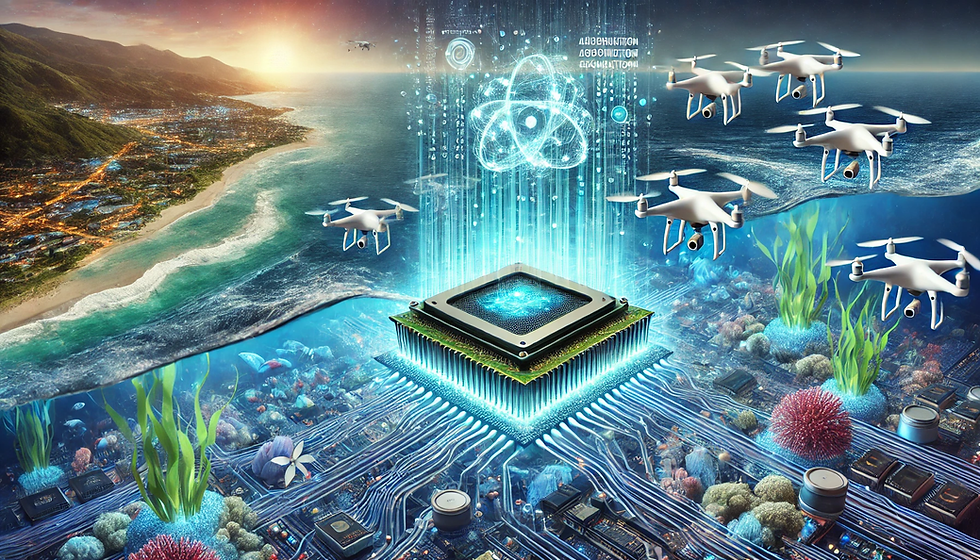Post #46: Quantum Computing in Marine Conservation: Theoretical Applications and Future Possibilities
- henry belfiori
- Dec 27, 2024
- 5 min read
With the release of Google's Willow chip, I have been going down the quantum computing rabbit hole since. I do not understand how we are not all talking about this tech continuously, so here is my 50 pence. Enjoy :)

A New Frontier in Marine Conservation
Marine conservation faces unprecedented challenges, from biodiversity loss to climate change. Traditional tools often fall short when tackling these complex, interconnected issues. Quantum computing, with its immense processing power and ability to handle intricate systems, offers a theoretical yet exciting pathway to address these problems.
In this blog, we explore the potential of quantum computing in marine conservation, touching on cutting-edge advancements like IBM’s Willow chip and the transformative applications this technology could unlock for protecting our oceans.
Quantum Computing: A Brief Primer
Quantum computing is a revolutionary approach to processing information, fundamentally different from classical computing. While traditional computers use bits (1s and 0s) to store and process data, quantum computers use quantum bits (qubits), which can exist in multiple states simultaneously due to the principles of superposition. This allows quantum computers to perform complex calculations at speeds that would take classical computers years, or even millennia, to achieve.
Key Principles of Quantum Computing
Superposition: Unlike classical bits, which are either 0 or 1, qubits can represent both at the same time, exponentially increasing computational power.
Entanglement: Qubits can be linked in such a way that the state of one qubit directly influences the state of another, no matter how far apart they are. This enables powerful correlations and faster problem-solving.
Quantum Interference: Quantum computers use interference patterns to home in on the most likely solutions, optimising results in a fraction of the time it would take classical algorithms.
The Willow Chip: A Quantum Milestone
Google's Willow chip is a breakthrough in quantum hardware, designed to stabilise qubits and reduce errors—a significant hurdle in making quantum computing practical. With advancements in coherence time (how long a qubit remains stable) and scalability, chips like Willow are bringing quantum technology closer to real-world applications, including marine conservation. It's release is one of the motivations for me to deep dive into this topic (and I am guessing many others like me).
Why Quantum Computing Matters for Marine Conservation
The complexity of marine ecosystems, combined with the vast amounts of data required to model and monitor them, often overwhelms classical computing systems. Quantum computers are uniquely suited to tackle these challenges due to their ability to process multiple variables and scenarios simultaneously.

Theoretical Applications of Quantum Computing in Marine Conservation
Quantum computing holds transformative potential for marine conservation by enabling solutions to complex problems that traditional computers struggle to address. From ecosystem modelling to real-time monitoring, here are some of the most promising theoretical applications of quantum technology in protecting our oceans.
Ecosystem Modelling and Simulation
Marine ecosystems are vast, interconnected, and influenced by countless variables, such as temperature, salinity, currents, and species interactions.
Quantum Advantage: Quantum computing can process these variables simultaneously, offering highly accurate simulations of ocean ecosystems.
Potential Impact: Predicting biodiversity shifts, understanding the effects of climate change, and identifying optimal locations for marine protected areas (MPAs).
Optimisation in Marine Resource Management
Sustainable management of marine resources, such as fisheries and shipping, requires solving highly complex optimisation problems.
Quantum Advantage: Quantum algorithms excel at finding optimal solutions for multi-variable problems, like balancing fish stock sustainability with economic viability.
Potential Impact: Reducing bycatch in fisheries, optimising shipping routes to minimise environmental disruption, and managing aquaculture operations for efficiency and sustainability.
Carbon Sequestration Insights
Oceans are critical in regulating the planet’s carbon balance, but modelling these cycles is computationally demanding due to the sheer number of interacting factors.
Quantum Advantage: Quantum systems can simulate chemical processes and ocean dynamics at unprecedented detail.
Potential Impact: Developing targeted strategies to enhance the ocean’s natural carbon sequestration capabilities, aiding global efforts to combat climate change.
Real-Time Monitoring with Quantum Sensors
Quantum computing goes hand in hand with advancements in quantum sensing, which offers unparalleled precision in data collection.
Quantum Advantage: Quantum sensors can detect microplastics, pollutants, and temperature shifts with greater accuracy than traditional methods.
Potential Impact: Enabling real-time monitoring of marine environments, providing early warnings for ecological disturbances, and improving the accuracy of long-term data collection.
Data Usage and Dispersion
The volume of data generated in marine conservation—from satellite imagery to IoT sensors—presents a challenge in terms of storage, processing, and effective dissemination.
Quantum Advantage: Quantum computing excels in managing large datasets by processing them in parallel and identifying patterns that classical systems would miss.
Potential Impact:
Improved Data Sharing: Quantum algorithms can help streamline the organisation and distribution of marine data, ensuring that researchers, policymakers, and NGOs have access to actionable insights.
Global Coordination: Enable international collaboration by analysing and sharing data across regions in real time, facilitating better decisions for global marine health.
Enhanced Predictive Analytics: Use quantum-processed datasets to predict trends, such as coral bleaching events or fish migration patterns, enabling preemptive conservation actions.

Challenges and the Road Ahead for Quantum Computing in Marine Conservation
Quantum computing holds immense potential for marine conservation, but several challenges must be overcome to translate its theoretical promise into practical impact. Addressing these hurdles requires innovation, collaboration, and forward-thinking strategies.
Current Challenges
Hardware and Cost Barriers: Quantum computers, such as IBM’s Willow chip systems, remain expensive and complex to operate, limiting accessibility for many conservation projects.
Theoretical vs Practical Applications: Many proposed quantum algorithms for marine conservation have not yet been tested in real-world settings.
Data Integration: Marine datasets from satellites, IoT sensors, and biodiversity studies require standardisation and quantum-compatible processing tools.
Skill Gaps: Limited collaboration between quantum computing researchers and marine conservationists creates a knowledge gap, slowing progress.
Environmental Concerns: Quantum computing infrastructure is energy-intensive, and its environmental impact must align with conservation goals.
The Path Forward
Interdisciplinary Collaboration: Building partnerships between quantum scientists, marine experts, and policymakers is essential for creating practical solutions.
Scaling Access: Initiatives to democratise quantum computing—such as cloud-based platforms—can make it more accessible to NGOs and smaller organisations.
Pilot Projects: Launching real-world pilots to test quantum algorithms in marine conservation scenarios, such as ecosystem modelling or plastic waste tracking.
Sustainable Practices: Prioritising renewable energy sources and optimising quantum computing processes to minimise ecological impact.

Unlocking the Quantum Potential for Our Oceans
Quantum computing represents a revolutionary frontier for marine conservation, offering the ability to solve complex problems at a scale previously unimaginable. From ecosystem modelling and resource optimisation to data management and real-time monitoring, its theoretical applications could transform how we protect and sustain our oceans.
However, the road to practical implementation requires overcoming significant challenges, including hardware accessibility, data integration, and environmental concerns. By fostering interdisciplinary collaboration, scaling pilot projects, and prioritising sustainable practices, we can bridge the gap between theory and reality.
As quantum technology continues to evolve, it’s crucial for researchers, innovators, and conservationists to join forces in unlocking its full potential for the benefit of our planet. The future of marine conservation may very well lie in the quantum realm, and the journey starts now.
Thank you for exploring this exciting topic with me, if you don't quite understand - you are not alone (myself included) ;) Ciao! 🌊
"Technology is the lifeblood of human progress, but only when wielded responsibly."
- Elon Musk

Sources
https://www.wsj.com/articles/the-age-of-quantum-software-has-already-started-854eccfa
https://builtin.com/hardware/quantum-computing-applications
https://research.aimultiple.com/quantum-computing-applications
https://www.nature.com/articles/s41598-021-93122-x.pdf
https://academic.oup.com/sysbio/article-abstract/66/3/453/2670095
Comments